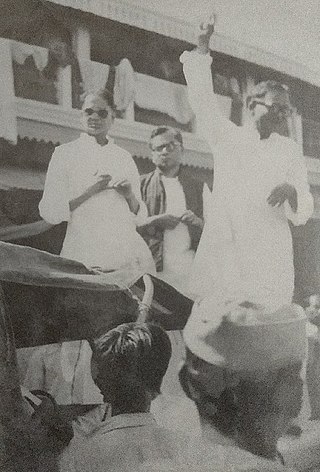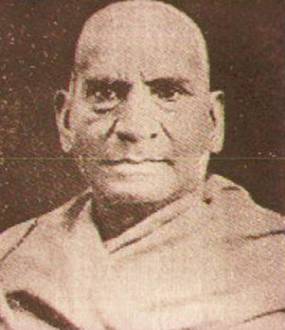
Mohandas Karamchand Gandhi, popularly known as Mahatma Gandhi, was an Indian revolutionary, anti-colonial nationalist, and political ethicist who employed nonviolent resistance to lead the successful campaign for India's independence from British rule and later inspire movements for civil rights and freedom across the world. The honorific epithet Mahātmā, first applied to him in 1914 in South Africa, is now used throughout the world.
Fatima Meer was a South African writer, academic, screenwriter, and prominent anti-apartheid activist.

Ahmed Mohamed Kathrada, sometimes known by the nickname "Kathy", was a South African politician and anti-apartheid activist.

The Congress Socialist Party (CSP) was a socialist caucus within the Indian National Congress. It was founded in 1934 by Congress members who rejected what they saw as the anti-rational mysticism of Gandhi as well as the sectarian attitude of the Communist Party of India towards the Congress. Influenced by Fabianism as well as Marxism-Leninism, the CSP included advocates of armed struggle or sabotage (such as Yusuf Meherally, Jai Prakash Narayan, and Basawon Singh as well as those who insisted upon Ahimsa or Nonviolent resistance. The CSP advocated decentralized socialism in which co-operatives, trade unions, independent farmers, and local authorities would hold a substantial share of the economic power.
The three Round Table Conferences of 1930–1932 were a series of peace conferences organized by the British Government and Indian political personalities to discuss constitutional reforms in India. These started in November 1930 and ended in December 1932. They were conducted as per the recommendation of Muhammad Ali Jinnah to Viceroy Lord Irwin and Prime Minister Ramsay MacDonald, and by the report submitted by the Simon Commission in May 1930. Demands for Swaraj or self-rule in India had been growing increasingly strong. B. R. Ambedkar, Jinnah, Sir Tej Bahadur Sapru, V. S. Srinivasa Sastri, Sir Muhammad Zafrulla Khan, K. T. Paul and Mirabehn were key participants from India. By the 1930s, many British politicians believed that India needed to move towards dominion status. However, there were significant disagreements between the Indian and the British political parties that the Conferences would not resolve. The key topic was about constitution and India which was mainly discussed in that conference. There were three Round Table Conferences from 1930 to 1932.

Gandhism is a body of ideas that describes the inspiration, vision, and the life work of M.K. Gandhi. It is particularly associated with his contributions to the idea of nonviolent resistance, sometimes also called civil resistance.
Yusuf Mohamed Dadoo was a South African Communist and an anti-apartheid activist. During his life, he was chair of both the South African Indian Congress and the South African Communist Party, as well as being a major proponent of co-operation between those organisations and the African National Congress. He was a leader of the Defiance Campaign and a defendant at the Treason Trial in 1956. His last days were spent in exile in London, where he is buried at Highgate Cemetery; a few metres away from the Tomb of Karl Marx.

Aruna Asaf Ali was an Indian educator, political activist, and publisher. An active participant in the Indian independence movement, she is widely remembered for hoisting the Indian National flag at the Gowalia Tank maidan, Bombay during the Quit India Movement in 1942. Post-independence, she remained active in politics, becoming Delhi's first Mayor.

Mukhtar Ahmed Ansari was an Indian nationalist and political leader, and former president of the Indian National Congress and the Muslim League during the Indian Independence Movement. One of the founders of the Jamia Millia Islamia University he remained its chancellor 1928 to 1936.
Gangathura Mohambry Naicker was a medical doctor and a South African anti-apartheid activist of Indian Tamil descent.

Ela Gandhi, is a South African peace activist and former politician. She served as a Member of Parliament in South Africa from 1994 to 2004, where she aligned with the African National Congress (ANC) party representing the Phoenix area of Inanda in the KwaZulu-Natal province. Her parliamentary committee assignments included the Welfare, and Public Enterprises committees as well as the ad hoc committee on Surrogate Motherhood. She was an alternate member of the Justice Committee and served on Theme Committee 5 on Judiciary and Legal Systems. She is the granddaughter of Mahatma Gandhi.

The Quit India speech was given by Mahatma Gandhi on the eve of the Quit India movement, August 8, 1942. His address was issued shortly before midnight at the Gowalia Tank Maidan park in Bombay, which has since been renamed August Kranti Maidan.
Madanjeet Singh was an Indian diplomat, painter, photographer, and writer.

Swami Shraddhanand, also known as Mahatma Munshi Ram Vij, was an Arya Samaj sannyasi and an Indian Independence activist who propagated the teachings of Dayananda Saraswati. This included the establishment of educational institutions, like the Gurukul Kangri University, and played a key role on the Sangathan and the Shuddhi (purification), a Hindu reform movement in the 1920s.

Internal resistance to apartheid in South Africa originated from several independent sectors of South African society and took forms ranging from social movements and passive resistance to guerrilla warfare. Mass action against the ruling National Party (NP) government, coupled with South Africa's growing international isolation and economic sanctions, were instrumental in leading to negotiations to end apartheid, which began formally in 1990 and ended with South Africa's first multiracial elections under a universal franchise in 1994.
Guru Radha Kishan (1925-1996) was an Indian Independence activist and Communist politician.
The Congress Alliance was an anti-apartheid political coalition formed in South Africa in the 1950s. Led by the African National Congress, the CA was multi-racial in makeup and committed to the principle of majority rule.

Enuga Sreenivasulu Reddy, also known as E. S. Reddy, was an Indian-born diplomat at the United Nations who led the anti-apartheid efforts at the UN's Special Committee Against Apartheid and its Centre Against Apartheid. He also served as director of the UN Trust Fund for South Africa and the Educational and Training Programme for Southern Africa. During his time in these roles, he campaigned for economic boycott of the then Government of South Africa, advancing anti-apartheid actions including a combination of economic and social measures. He also lobbied for the release of the imprisoned leader Nelson Mandela.

S. P. Varma is a social worker and a peace activist from Jammu and Kashmir who has made exemplary contribution by spreading the message of peace in trouble-torn areas of the Kashmir valley. He met Nirmala Deshpande, an eminent Gandhian, at Jammu in 1990. Inspired by her work and dedication, he left his government job and dedicated himself to Gandhism.
Ismail Ahmed Cachalia (1908-2003), popularly known as Moulvi, was a South African political activist and a leader of Transvaal Indian Congress and the African National Congress. He was one of the leaders of the Indian Passive Resistance Campaign of 1946 and the Defiance Campaign in 1952. The Government of India awarded the fourth highest Indian civilian honour of Padma Shri in 1977.












